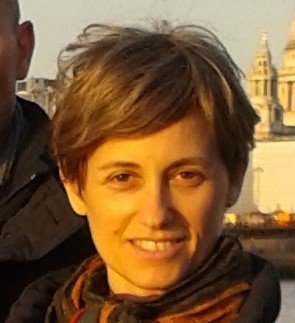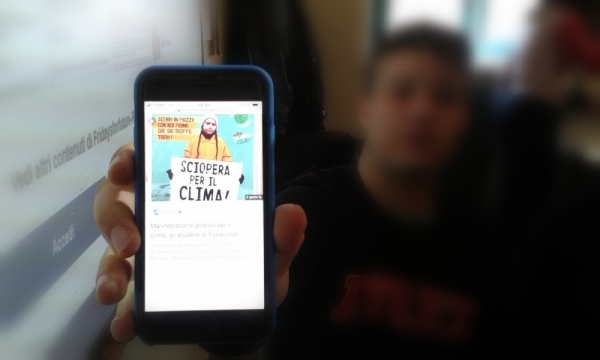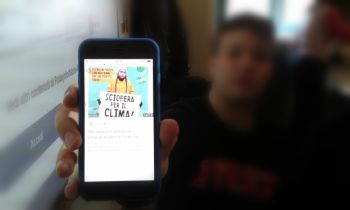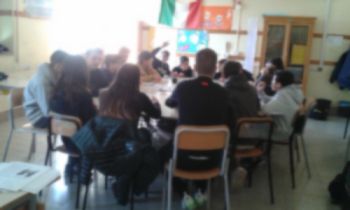Mrs. Irene Rinaldi teaches Technology at the San Pio V Lower Secondary School (Rome), where this year she has tested one of Get Up and Goals! Teaching and Learning Units about Climate change with her last-year students.
The lessons, which continued throughout the school year, resulted in lots of stimuli for both the teacher and the students, real impacts on the participants’ lifestyles, and some interesting reflections on the critical aspects of the TLU. In fact, if on the one hand the urgency of studying climate-related topics met with enthusiastic students, on the other hand it clashed with the difficulties of a school system in which creating an interdisciplinary collaboration can be challenging, if not impossible.
We warmly thank Mrs. Rinaldi for her valued feedback and the precious words she accepted to share with other teachers through the following interview.
 |
Mrs. Irene Rinaldi |
How do the 2030 Agenda Goals embed with your teaching subject?
Technology’s program for final-year students addresses energy, sustainability and the search for the most sustainable energy sources. The whole program revolves around that: causes and consequences of Climate change. My work was not simply using a TLU, but rather managing the whole year program and testing new ways to embed Climate change within each lesson.
Climate change is already part of your program; so why have you decided to use Get Up and Goals! resources and TLUs?
I usually quit the schools’ textbooks pretty early. Instead, I push students to use any available learning source. Therefore, the textbook is just another tool, and maybe more useful for those students who find it easier to use one tool only. Using a number of learning tools can be challenging and it requires complex skills to handle them all at the same time. While training for Get Up and Goals! I found out many resources were available, and my effort was choosing, studying, and using them with my students. Therefore, I tested the TLU with students who already work this way.
What was your student’s reaction on the subject of Climate change? Is it true they are absent-minded and shallow?
As for the chosen method of using more learning sources, the students are ready for it and the School is more and more open about it, therefore I had no problems, besides the fact that I was charging my students with a heavier workload.
As for the subject, Climate change is pretty popular lately, which means it is easy to trivialise. Each teacher names it at least once during the school year. Yet, naming it is one thing, exploring it in all its part is something else. Most students understood the complexity behind the matter and the urgency of facing it, also by changing their own habits and lifestyles.
What subjects had the biggest impact?
I must say that it was a tough start, because I showed them a lot of resources and they were a bit defensive at the beginning. So, there was a critical approach. At the beginning the impact was hard, the students said: "Oh God, what is happening here?"
Then we explored the entire subject, but it took long. My two hours per week are not enough to take a subject, develop it, understand it, elaborate it and even give solutions to it. As a result, at the beginning the students went home rather upset and worried.
Carbon footprint was very interesting for them. They knew something about it from Science class and decided to calculate their own footprint, trying to understand whether their life had a positive or negative impact on the environment. They made comparisons and talked a lot. It was an interesting work, a hands-on approach.
What are the most important results so far?
For sure there has been an impact on their daily habits. For instance, students have started correcting their parents’ behaviour. They are our future and we have to count on them to dramatically change our nearest future, let’s say within the next 10 years. It’s important that they know these matters, correct other people’s behaviours, stop discussions, talk to their parents and their peers. All of that is something they are already doing, and it is very important.
Have you done any citizenship actions? How did they go?
We have done one action to celebrate National Energy Conservation Day. My students entered other classrooms in a kind of a flash mob aimed at raising awareness around the climate issue. They had slogans and chants, stormed other classrooms without permissions and for 3 minutes surely caught everyone's attention.
Also, they took part to the Fridays for Future. They are underage and aren’t allowed to demonstrate outside, so we turned our classrooms into squares and held special lessons there.
The plan was to end the TLU with a bike ride, which was the most significant action and it was supposed to lead to another flash mob. However, everything was canceled due to safety issues. It seems that any action taking place outside of the school building entails a certain degree of safety rules, which the School could not ensure. The students were sorry, but eventually we let them demonstrate in the classrooms.
Have you had the chance to collaborate with your colleagues? How did it go?
I must say that’s the limitation I have experienced while testing the TLU. I teach two hours per week only, and that’s why I had to spread the program throughout the whole year. I’m sure it would all be much more effective if I could collaborate with my colleagues. But I believe it should be a shared goal, decided at Class Council level.
A teachers’ collaboration would also be good for the students, since as it stands teaching is so fragmented that after my class, and for the rest of the week, the boys and girls forget what they did with me. That’s a major issue.
I would suggest two teachers working together for a shorter time span, let’s say 3-4 months, debating each issue from different points of view, thoroughly, so not to trivialise it.
Currently it’s not like that. I had to work on my own and that meant I had to work much harder.
I must stress that my colleagues are very sensitive about Climate change. Many of them changed their lifestyle and embraced sustainable ways of living, yet they did not think of becoming an example to their students by using the TLU in their classes.
I’m sure it depends on the number of hours: my Science and Maths colleagues have tight programs, while Technology only has a keyword, “energy”, and I can do what I want with it.
I believe the problem is due to the organizational structure of Lower Secondary Schools. Our Class Councils aren’t meant to be project-based, but simply evaluative.
Some other times teachers build their own boundaries. I think we should try and not to be prejudiced, to get involved, to just put ourselves out there. For instance, teaching a few classes together could play a key role. I never know what students know about the other subjects. Sharing a class with a colleague would allow me to start from where she stopped.
Will you keep using Get Up and Goals! resources and methods in the future? And how?
Next year I will do it again with my last-year students, but I will try and organise it differently. I’ll try to involve my Science colleague, giving him a specific assignment so not to scare him. I might ask him to look at the consequences of Climate change in terms of Nature or Chemistry. For instance, I know that some of the consequences of Climate change on the Oceans and the Earth can already be seen from outer space, and I have links to show in the classroom. But how can I include those in my program? Maybe, I’ll pass them to my colleague!
What amused you the most during this path?
I really enjoyed the flash mob in the other classrooms as it has been a way to involve all students, even the ones that usually feel left behind. They have found their way, something to do, and felt like being part of something. That made them happy.
Nobody knew that we were about to storm other classrooms with a flash mob. The deputy head-teacher said: “You should have told me”. And I went like: “You do not call flash mobs!”. My colleagues were all happy with it, but then I was told some of them were actually complaining about the interruption of their lessons. I guess that’s normal, though, and eventually we clarified it all.
Anything else to share with your colleagues?
I would like to stress that last September’s training course (the teachers’ training on the themes of the Get Up and Goals! project, ed.) was awesome. Finally, a training of which teachers say: "This is great, I want to go". Because we learnt new things and, for once, it was like being back at Uni. Also, I now want to test other subjects too. I teach Technology, therefore talking Climate change is natural, but next year I would like to teach International inequalities. I would love to talk to my students about reducing differences among countries, talking economics.
In Olomouc I have seen colleagues working on such topics and I am very curious about them. There are so many resources available, and so easy for my students to understand.
-
Be involved!
Would you like to take part in one of Get Up and Goals! next teachers trainings?
Follow us on Facebook, subscribe to our Newsletter, keep in touch and be part of our movement to reach the 17 SDGs and spread the Global Citizen Education!





